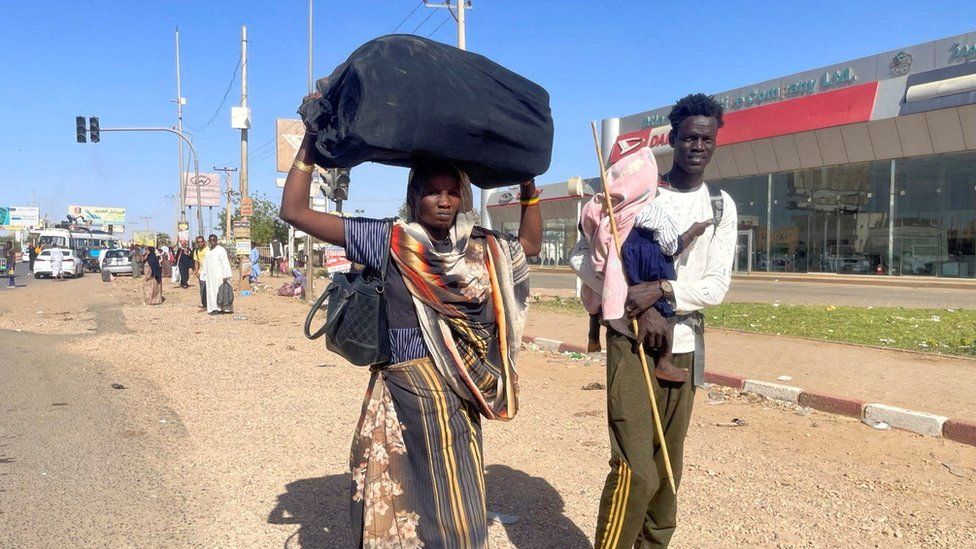Diplomatic pressure is being stepped up to end the fighting in Sudan which has left more than 300 people dead in the last week.
The regular army has been fighting a paramilitary force called the Rapid Support Forces (RSF).
The UN, US and other countries have been pushing for a three-day truce to mark the Muslim holiday of Eid al-Fitr.
The RSF says it has agreed to a 72-hour truce on humanitarian grounds. There was no immediate comment from the army.
The truce would be in place from 06:00 (04:00 GMT) on Friday to coincide with the festival, the RSF said.
Two previous attempted ceasefires failed to take effect.
The head of the army, General Abdel Fattah al-Burhan, earlier dismissed the possibility of negotiations with the RSF.
The latest hope of a temporary truce came after UN Secretary General António Guterres appealed for a ceasefire to allow civilians to reach safety.
The Eid ceasefire “must be the first step in providing respite from the fighting and paving the way for a permanent ceasefire”, Mr Guterres said.
“This ceasefire is absolutely crucial at the present moment,” he added.
Eid is the Muslim festival marking the end of the fast of Ramadan.
The UN has warned that between 10,000 and 20,000 people – mostly women and children – have fled Sudan amid bitter fighting there, to seek safety in neighbouring Chad.
US Secretary of State Antony Blinken also appealed to the warring military leaders separately to join a ceasefire at least until Sunday.
Mr Blinken “expressed grave US concern about the risk to civilians, humanitarian and diplomatic personnel, including US personnel” from the fighting, the state department said.
A Sudanese army statement said Gen Burhan had received calls from the Turkish, South Sudanese and Ethiopian leaders, as well as Mr Blinken and the Saudi and Qatari foreign ministers.

The two military men at the centre of the crisis are Gen Burhan and Mohamed Hamdan Dagalo, a former warlord known as Hemedti.
Both served under the previous president, Omar al-Bashir, until they turned on him in 2019, after months of pro-democracy protests.
They have large numbers of troops at their disposal. Gen Burhan has the regular military – around 120,000 strong – while the RSF has as many as 150,000, with a fearsome reputation for violence.
They were part of a transitional administration that was supposed to pave the way for a democratic government.
But in 2021 Gen Burhan staged a military coup, putting all that on hold.
Last year, there was another agreement on transition, but by now the two men had become rivals who were unable to agree on how their armed forces could be merged into a single military.
There are economic interests too, especially gold. It is the country’s biggest export, and Hemedti’s family has a big stake in it.
It has strategic importance too. A lot of the gold goes to the United Arab Emirates. Russia’s Wagner Group, which has fighters in Ukraine, has lucrative mining interests too, which is very useful for the Kremlin.
Sudan is Africa’s third biggest country. What happens there matters, to its neighbours and to the wider world.
Russia, the US, Saudi Arabia and lots of other countries are vying for influence. And watching, nervously, to see if civil war is about to erupt.





